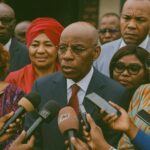Brazzaville’s Cultural Showcase Defies Fiscal Gravity
When Minister of Communication Thierry Lézin Moungalla emerged from the Council of Ministers with the confirmation that the Panafrican Music Festival would indeed begin on 12 July 2025, few observers were genuinely surprised. The Republic of the Congo has, over the last three decades, elevated FESPAM to the rank of strategic soft-power instrument; cancelling or postponing it would have sent a discordant signal to regional partners and multilateral creditors alike. Nonetheless, the minister’s insistence that the festival would adopt “a format adapted to the conjuncture” discreetly acknowledged a public-finance environment that remains delicate after successive external shocks (Les Dépêches de Brazzaville, 17 July 2024).
- Brazzaville’s Cultural Showcase Defies Fiscal Gravity
- A Digital-Centric Theme Echoes Continental Trends
- Financing the Arts Under Fiscal Consolidation
- Soft-Power Calculus in Central Africa
- Economic Spillovers and Urban Revival
- Heritage Curation Meets Youthful Innovation
- A Measured Crescendo Toward July 2025
A Digital-Centric Theme Echoes Continental Trends
The chosen theme—“Music and Economic Stakes in Africa at the Digital Age”—aligns neatly with the continental surge in mobile streaming and intellectual-property monetisation. According to the African Union’s recent cultural-industries report, the digital music market on the continent is projected to exceed USD 1 billion by 2026, a figure unthinkable at the time of FESPAM’s creation in 1996. Brazzaville’s decision to foreground digital transformation therefore appears less cosmetic than strategic, allowing the festival to double as a policy forum where ministers, platform founders and copyright lawyers can debate cross-border royalty frameworks.
Financing the Arts Under Fiscal Consolidation
Congo’s 2024 supplementary budget continues to prioritise public-debt reduction and infrastructure maintenance, leaving limited discretionary space. Government advisers privately concede that the cultural envelope has been recalibrated downward by nearly fifteen percent compared to the previous triennium (African Development Bank briefing, April 2024). Yet the Presidency’s decision to ring-fence core FESPAM expenditures—logistics, stage technology, artist mobility—illustrates a broader doctrine that cultural diplomacy constitutes an intangible asset with multiplier effects exceeding its immediate cost. In that vein, several corporate sponsors, notably a regional telecommunications operator and two pan-African banks, have been invited to underwrite connectivity hubs and fintech demonstrations during the festival. By blending public subvention with private sponsorship, policymakers hope to shield FESPAM from future macroeconomic swings while signalling credibility to investors.
Soft-Power Calculus in Central Africa
Within Central Africa’s competitive diplomatic ecosystem, hosting a high-visibility cultural summit confers advantages that go well beyond entertainment. Brazzaville’s proximity to Kinshasa across the Congo River has long fuelled a benign rivalry in rumba, yet the Congolese capital now positions itself as a neutral convening space for artists from Angola to Ethiopia. A senior official at the African Union’s Department of Social Affairs notes that FESPAM remains “one of the most consistent vehicles for regional people-to-people integration” (interview, Addis Ababa, May 2024). By anchoring the festival under AU patronage, President Denis Sassou Nguesso reinforces the country’s reputation as a mediator in sub-regional disputes, capitalising on the symbolic language of music to soften diplomatic edges.
Economic Spillovers and Urban Revival
Hotel managers along Avenue de la Corniche are already reporting occupancy levels approaching eighty percent for the festival week, a figure that mirrors the pre-pandemic high of 2019. The Ministry of Tourism projects that ancillary spending by visitors—on crafts, gastronomy and intercity transport—could inject up to XAF 6 billion into the metropolitan economy, a modest yet welcome boost for small and medium-sized enterprises recovering from the oil price slump. City officials have accelerated façade renovations and street-lighting upgrades, mindful that the urban experience of delegates often informs their broader perceptions of investment climate. Brazzaville’s mayor’s office confirms that roughly two hundred temporary jobs have been created for maintenance, security and cultural-mediator roles, illustrating how a festival can translate into tangible livelihood opportunities.
Heritage Curation Meets Youthful Innovation
Beyond concerts, the 2025 programme features a curated exhibition of traditional instruments ranging from the ngoma drums of the Great Lakes to the balafons of West Africa. Curators plan to juxtapose these artefacts with interactive digital kiosks that demonstrate how samples of ancestral sounds can be remixed in contemporary genres. A documentary on Congolese rumba, recently inscribed on UNESCO’s Representative List of Intangible Cultural Heritage, will receive its premiere, offering younger audiences both entertainment and archival consciousness. Musicologists from the University of Brazzaville argue that such hybrid content nurtures an intergenerational dialogue essential for safeguarding cultural memory while ensuring relevance in global charts. The delicate equilibrium between preservation and innovation, long debated in academic circles, will thus unfold in real time on the banks of the Congo River.
A Measured Crescendo Toward July 2025
With twelve months to refine protocols and finalise sponsorships, organisers appear confident that FESPAM’s twelfth edition will meet both fiscal realities and artistic ambitions. The coming year will test the country’s capacity to synchronise procurement cycles, visa facilitation and digital-rights management in an era when cultural events are increasingly judged by their technological sophistication. Yet if Brazzaville succeeds, the festival could emerge not merely as a celebration of African rhythms but as a blueprint for culturally anchored economic diversification. In that scenario, the strains of budget blues may well resolve into a harmonious major chord.


















